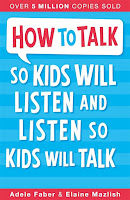 |
| (Amazon UK link) |
However, when I saw 'How to talk so kids will listen and listen so kids will talk' on the Bookbag shelves, I leapt at the chance to re-read it. In doing so, I felt a touch of regret that I had not had a copy to refer to regularly when my sons were growing up.
This book aims to reverse the negative, punishment-based parenting that is so common these days. Children are seen not as problems, but as lovable small people needing a little guidance. The authors propose a new ‘language’ which begins with listening properly, helping children to deal with their feelings by encouraging them to name their fears - or anger - by observation, gentle discussion, and acceptance.
The next chapter is about encouraging co-operation. Parents are told not to demand, accuse, threaten or bribe their children, but to express a problem in neutral terms: ‘the milk is spilled; we need a cloth.’ Different techniques are advised, depending on circumstances. Far too many adults get caught up in trying to control rather than co-operate, and nagging rather than finding appropriate ways to communicate their wishes.
Further chapters include topics such as encouraging autonomy, finding alternatives to punishment, offering encouraging praise, and freeing children from roles: positive ones as well as negative name-calling.
Each chapter describes typical scenarios, then proposes alternative ways to deal with them. Towards the end of each chapter there’s a section with exercises for parents to try during the week, encouraging them to observe the ways they interact with their children. This is followed by examples from workshops which are easily recognisable, and mostly reassuring.
This 30th anniversary edition has been expanded, including a section written by the daughter of one of the authors, recounting some of the frustrations she had with her own children. The non-coercive, language of communicating came naturally to her, but it didn’t turn her children into angels, nor did it mean that she always made the right responses. Her account is amusing in places, and very encouraging.
My own experience in the past suggests that, while it’s not easy to adopt all the principles, they do work eventually. I made plenty of mistakes, but as the authors point out, there are always second chance with children.
Very highly recommended indeed.
You can also read my somewhat longer review of 'How to Talk so Kids will Listen and Listen so Kids will Talk' at The Bookbag.
No comments:
Post a Comment